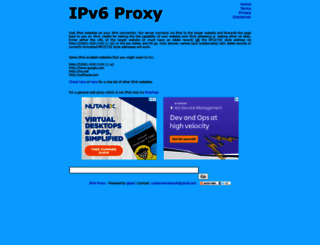IPv6 Proxy | View IPv6 Websites and Test IPv6 Functionality
Page Load Speed
1.2 sec in total
First Response
245 ms
Resources Loaded
896 ms
Page Rendered
76 ms

About Website
Visit ipv6proxy.net now to see the best up-to-date IPv6 Proxy content for Russia and also check out these interesting facts you probably never knew about ipv6proxy.net
Visit IPv6 websites through your IPv4 connection. Our free IPv6 web proxy connects to the target via IPv6 and forwards the content on to you over IPv4.
Visit ipv6proxy.netKey Findings
We analyzed Ipv6proxy.net page load time and found that the first response time was 245 ms and then it took 972 ms to load all DOM resources and completely render a web page. This is quite a good result, as only 20% of websites can load faster.